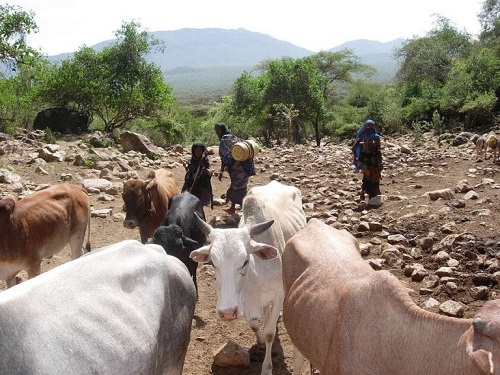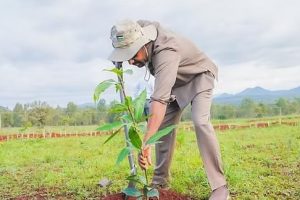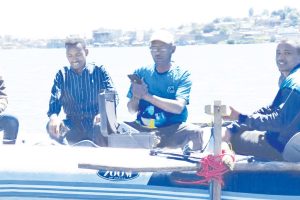
BY EPHREM ANDARGACHEW
The Horn of Africa region is among the regions of the world known for conflict between pastoralist communities. The pastoralists fight each other due to resource competition as the region frequently experiences recurrent droughts.
Yet pastoralist communities in Southern Ethiopia, are showing some impetus of changing this history as they help each other during time of adversity. Pastoralists in Gedeo Zone have offered to feed cattle from Borana Zone who have fallen prone to the current alarming drought.
Currently, drought affects the Horn of Africa nations, and urgent government and concerned bodies intervention are needed to provide humanitarian assistance. The region has experienced consecutive failed rainy seasons which resulted in one of the driest periods. Ethiopia, as part of the Horn of Africa region, has also been facing recurrent drought.
In Ethiopia, the majority of the population is engaged in agriculture. The agriculture sector in its part supplies a significant proportion of the raw materials for the agro-industries. The sector is important for the nation’s gross product and export earnings.
Nonetheless, climatic, ecological, and socioeconomic diversities have been influencing the Ethiopian agriculture sector. Particularly, the reliance of most of the population on rain-fed agriculture has made the country’s economy awfully vulnerable to the effects of weather and climate, which are extremely variable both temporally and spatially.
Studies have shown that if rains fail in one season, the farmers couldn’t fulfill their needs and pay their obligations: tax, credit, and the like. Farmers, therefore, persist in the bottom line of poverty and lead a risky life. Moreover, due to climatic change and other human-induced factors, areas affected by drought and desertification are expanding in Ethiopia.
Based on the country’s experiences, drought has been impacting nearly all sectors in Ethiopia; agriculture (loss of crops and livestock), water resources (increase in evaporation and decline in the availability of freshwater which results in water stress), inadequate water for industry, reduced electricity production (from hydropower) and so on.
The impact of drought on ecosystems is significant which causes loss of wetlands and lakes, loss of forest and soil cover, increased soil erosion, and land degradation. The social and economic impacts could also be increased human and livestock diseases, migration, conflict over water, and the decline in the National Gross Domestic Product (GDP). Hence, perhaps nowhere else is the change in weather (drought) and climate regimes more noticeable than in the water sector which in turn impacts all other sectors significantly.
Due to the aforementioned and related problems, recently, drought has occurred in some parts of Ethiopia which influences the lives of humans, animals, and biodiversity. Cognizant of this, the government, individuals, Regional states, City Administration, and stakeholders are providing humanitarian assistance in accordance with their capacity. The government put also direction to provide support for drought-affected areas of the nation.
According to Deputy Prime Minister and Minister of Foreign Affairs Demeke Mekonnen, urgent action and response for immediate humanitarian support are needed to those influenced by the drought in various parts of the country.
Demeke acknowledged the efforts that have been made by various bodies, the need for concerted efforts to deliver emergency assistance to those in need. Besides, sustainable development and emergency support system are important to overcoming challenges facing beneficiaries.
Disaster Risk Management Commissioner, Mitiku Kassa said that the support and emergency response mechanism are under implementation in line with the decisions and directions of the national committee. However, the complexity of the problems facing Ethiopia and the inadequate support from partners are essentially creating a negative impact on the support and response endeavors.
In actual fact, it is essential to support each other instead of expecting donors and other partners. Expecting and depending on others has no result or the result could be a very short time. Hence, local donor and the local solution is key to coup drought-related effects and other man-made difficulties in Ethiopia. Taking these facts into consideration, the Addis Ababa city Administration has donated 100 million birrs to drought-affected areas in the Somalia region.
Addis Ababa city Administration Mayor Adanech Abebe said that “your pain is our pain; your problem is our problem; “we feel the damage of the drought has been done to all of us.”
Hence, “our country is able to overcome the problems it is facing now by standing and supporting together. We will pass it, we have the energy, the capacity, the value, and the experience to do this,” she underlined.
Somalia Regional State President Mustafa Mohammed in his part noted that all Ethiopians are doing their part in fulfilling their national duty to cope with the drought that has occurred in the region. Besides, efforts are underway to prevent the drought from turning into a famine in the region.
According to Borena Zone Administrator Jarso Boru, since the onset of the drought due to lack of (Bega) winter and (Tseday) spring rains, various efforts have been made to provide support for the Zone which include: fodder for the cattle, water tankers, containers, medical supplies, food to the affected people to reduce the damage caused by the drought, and so on.
More importantly, the Gedeo Zone, which is found in Southern Nations, Nationalities, and People’s Region (SNNPR), has received cattle from the drought-affected Borena Zone and grazes them on grazing land of the Zone. Accordingly, tens of thousands of cattle are grazing in Gedeo Zone and recovering from the effects of the drought.
According to the information gathered from Gedeo Zone, cattle that are arriving in the zone have improved their health. Nevertheless, much remains to be done to recover quickly from their previous injuries, and are still in need of vaccination and follow-up. The pastoralists have brought their cattle from Yabello, Arero, and Dere woredas to Gedede woreda.
Harari Regional State has also contributed its part to drought-affected regions of the country. Especially, the region has handed over 10 million birr in cash and 1 million birrs in kind to drought-affected communities in the Somalia Regional State. As stated by Harari President Ordin Diri, since all Ethiopians are linked by history and blood, it is important to provide support to drought-affected communities across the country.
It is obvious that recurrent drought is a challenge to Ethiopia while, it is a fact that, sharing pain and supporting each other during rainy seasons is a culture of Ethiopian. Recognizing the problem of others is essential to minimize, if possible to alleviate, the problem since the damage has been done across the nation.
The initiative of the people, individuals, the city administrations, and the regional state’s need acknowledgement. Especially, the action that has been taken by the Gedeo Zone, which has received drought-affected Borena Zone cattle and grazes them on grazing land, is strategic to pass this rainy season. However, extensive efforts, plan for short and long-term activities are still needed from the government, the concerned bodies, stakeholders, partners, and so on to prevent the drought from turning into a famine.
The Ethiopian Herald January 19/2022





